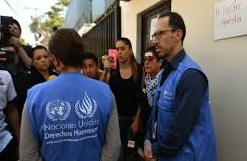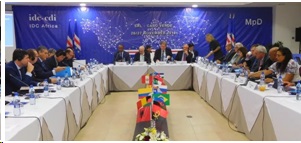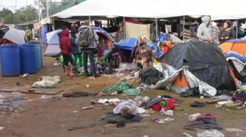La Congregación para la Doctrina de la Fe condenó al excardenal y ex-arzobispo de Washington, Theodore Edgar McCarrick, por abusos sexuales a menores y adultos con agravante de abuso de poder.
 Vaticano, Feb. 16 (DP.net).– El antiguo arzobispo emérito de Washington Theodore McCarrick, de 88 años, acusado de abusos sexuales a menores y seminaristas, ha sido declarado culpable por la Congregación para la Doctrina de la Fe de abusos con la agravante de abuso de poder, le anula su título cardenalicio y le impone la pena de la reducción al estado laical, es decir, la expulsión del sacerdocio.
Vaticano, Feb. 16 (DP.net).– El antiguo arzobispo emérito de Washington Theodore McCarrick, de 88 años, acusado de abusos sexuales a menores y seminaristas, ha sido declarado culpable por la Congregación para la Doctrina de la Fe de abusos con la agravante de abuso de poder, le anula su título cardenalicio y le impone la pena de la reducción al estado laical, es decir, la expulsión del sacerdocio.
La decisión llega tras una investigación que ordenó el papa Francisco. El Sumo Pontífice ya había apartado al arzobispo de sus funciones en el Colegio Cardenalicio mientras se aclaraban en un juicio canónico las acusaciones contra él.
- Hits: 6932
 del país a la Comisión Internacional Contra la Impunidad (CICIG), un órgano de la ONU que se encarga de investigar los casos de corrupción. Tras ocho horas de deliberaciones, el Pleno de Magistrados de la CC aprobó por mayoría y con el único voto disidente de la Presidenta, Dina Ochoa, "dejar en suspenso" la decisión de Morales de dar por terminado de manera "anticipada y unilateral" el acuerdo entre la ONU y el Gobierno de Guatemala relativo al establecimiento de la CICIG.
del país a la Comisión Internacional Contra la Impunidad (CICIG), un órgano de la ONU que se encarga de investigar los casos de corrupción. Tras ocho horas de deliberaciones, el Pleno de Magistrados de la CC aprobó por mayoría y con el único voto disidente de la Presidenta, Dina Ochoa, "dejar en suspenso" la decisión de Morales de dar por terminado de manera "anticipada y unilateral" el acuerdo entre la ONU y el Gobierno de Guatemala relativo al establecimiento de la CICIG. represión en Cuba desde que Miguel Díaz-Canel asumió la presidencia y critica al presidente del Gobierno español, Pedro Sánchez, por no reunirse con la oposición en su reciente viaje a la isla.
represión en Cuba desde que Miguel Díaz-Canel asumió la presidencia y critica al presidente del Gobierno español, Pedro Sánchez, por no reunirse con la oposición en su reciente viaje a la isla.